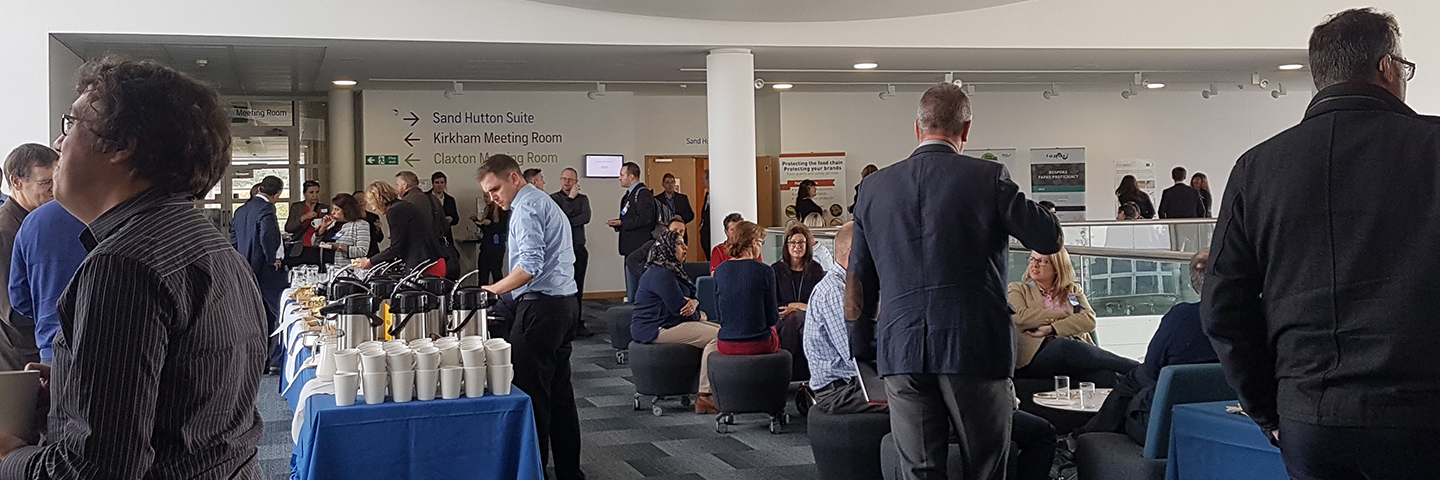The fourth bi-annual FuturePack meeting took place at Fera on Thursday 4th October. Leading representatives from industry, academia and government gathered to hear about recent technological developments and discuss strategies to improve the sustainability of packaging and achievement of a circular economy.
The presentations and audience comments confirmed that there was a strong desire by industry to be able to access packaging that was sustainably sourced, could be re-used, recycled or re-purposed. Simply replacing non-recyclable oil-derived plastics was constrained by the current availability of alternative packaging materials that had acceptable performance characteristics and were economic to use. Derek Croucher of Morning Foods gave a personal view of the challenges facing many in the industry and highlighted that economics is the ultimate driver of industrial decision making which will ultimately constrain how new packaging materials are introduced and deployed. A simple index of packaging material sustainability would aid both the manufacturer’s and the consumer’s decision making in selection materials or products.
Andy Sweetman of Futamura UK illustrated that many new bio-based packaging materials have been developed which after some initial hype, are now beginning to offer credible solutions to replace much current plastic packaging with similar performance characteristics. It is hoped that as awareness of these solutions grows, production volumes will rise and costs fall enabling greater uptake. The initial applications will be low volume premium goods where costs can be absorbed, but as the sector develops progression towards wider use of bio-based packaging is expected.
Emma Bradley of Fera Science Ltd reviewed packaging legislation in relation to existing and new materials and some of the technological solutions that can be applied to minimise risks posed by food contact materials to food safety and consumer health. It was highlighted that over 30 years work has been dedicated to developing systems and analytical capabilities in relation to traditional polymers used for packaging and yet there are still gaps in the knowledge. In comparison, the risks from new sustainable materials are much less well understood and there is a need to develop the science to ensure that consumer protection can be maintained.
Lisa Roddis of Cranswick PLC demonstrated the depth of concern and seriousness with which the current plastic perception problems are being treated, acknowledging the need to demonstrate excellent corporate and social responsibility. Simplification of the range of packaging materials and a focus on those with the capability to be recycled such as PET was the start of the process to obtaining a circular economy. The importance of engaging with waste handling and processing businesses to achieve circularisation was also discussed and this was an issue that resonated with the audience.
Chetan Parmar of Decernis discussed the frequently extended nature of modern packaging value chains and their potential vulnerability to loss of integrity. Similar to food, protection against fraudulent activity that can result in unsafe or inferior materials was needed. Software systems had been developed to aid the management of supply chain information and business confidence. The expected increase in recycled materials within the value chain was considered to present additional stress and greater information requirements.
Dr Andrew Swift, chief executive officer at Fera Science, said: “It’s exciting to know that there is so much interest in discussing strategies to improve the sustainability of packaging and achievement of a circular economy. This the fourth bi-annual FuturePack meeting taking place at NAFIC today with leading representatives from industry, academia and government gathering to hear about recent technological developments confirms that as new sustainable materials are developed they are much less well understood therefore there is a need to develop science to ensure that the environment and consumer protection can be maintained.”




